Navigating the world of air travel with weed pens can be tricky, but understanding the rules is key. Can You Fly With Weed Pens? Yes, but flyermedia.net will guide you through everything you need to know about safely and legally traveling with weed pens, including regulations, packing tips, and potential risks. Be sure to check out our comprehensive guide to stay informed and travel confidently with aviation regulations, hemp-derived products, and the latest TSA guidelines.
1. What Exactly is a Weed Pen?
A weed pen, also known as a vape pen, is a compact, portable device designed for vaporizing cannabis concentrates, oils, or even dried flower. Instead of burning the substance, these pens heat the material to create vapor, which is then inhaled. Delta 9 THC, the psychoactive component in weed, is often the main ingredient.
Rather than igniting weed and inhaling smoke, as with traditional methods, a weed pen heats the THC or CBD in concentrates, oil or dried flowers form to a specific temperature. This method offers a discreet and convenient way to consume cannabis.
Weed pens typically consist of four main components:
- Battery: Powers the device.
- Atomizer: Heats the cannabis material.
- Heating Chamber: Where the cannabis is placed.
- Mouthpiece: Used to inhale the vapor.
They come in two primary types:
- Disposable: Single-use pens that are discarded once the material is depleted.
- Reusable: Pens with refillable cartridges or chambers, allowing for multiple uses.
These devices are favored for their portability, ease of use, and discreet nature.
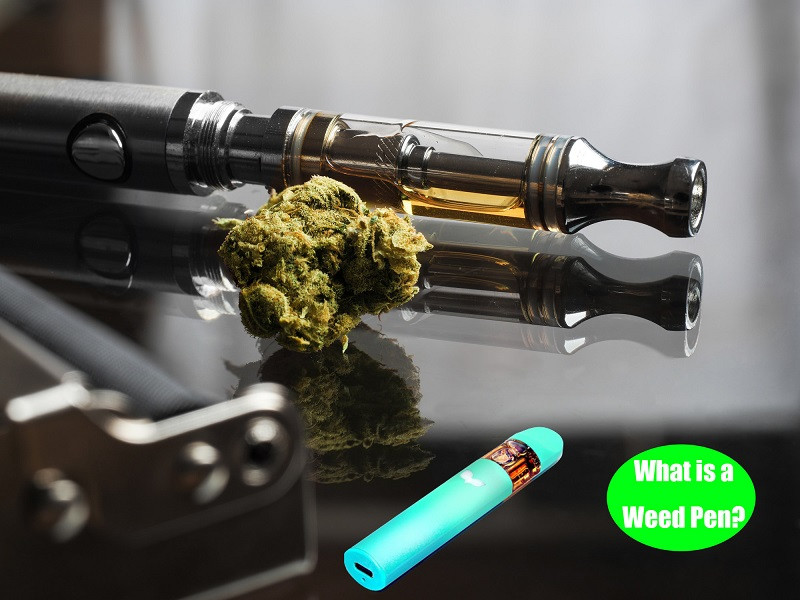 Close-up of a disassembled weed pen showing its components: battery, atomizer, heating chamber, and mouthpiece.
Close-up of a disassembled weed pen showing its components: battery, atomizer, heating chamber, and mouthpiece.
2. Is it Legal to Bring a Weed Pen on a Plane in the USA?
Technically, no. Despite varying state laws on cannabis, federal regulations still prohibit flying with THC vape cartridges or weed. Flying with a weed pen can be risky, and you could face arrest.
According to research from Embry-Riddle Aeronautical University, federal law supersedes state law in aviation, meaning that even if cannabis is legal in your origin and destination states, it remains illegal to fly with it.
The TSA allows nicotine electronic cigarettes (vaporizers, vape pens, and ENDS) as carry-ons. To take a weed pen on a plane, consider it carefully because it’s hard to tell a THC cart from a nicotine cart except for the label.
- Carry-On vs. Checked Baggage: Vape pens must be in your carry-on, not checked baggage. Vape pens contain lithium batteries, posing a fire risk in the cargo hold.
- Battery Regulations: Lithium-ion batteries must not exceed 100 Wh, or lithium metal batteries must have a lithium content of 2 grams.
- Safety Measures: Turn off the vape and remove batteries, storing them separately in a protective case to prevent accidental activation.
- Usage Restrictions: Using or recharging the vape pen during the flight is prohibited and can result in fines or arrest.
- Quantity Limits: Check with your airline for limitations on the number of devices allowed for personal use.
- Liquid Regulations: If the cartridge contains liquid, it must be in a quart-sized bag with other liquids, each container not exceeding 100ml (3.4oz).
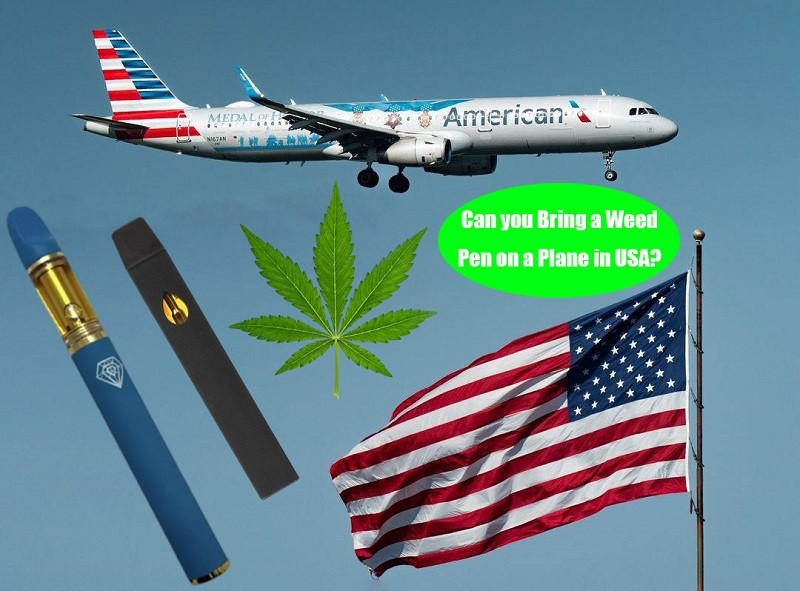 A hand placing a weed pen and cartridges into a clear quart-sized bag for airport security.
A hand placing a weed pen and cartridges into a clear quart-sized bag for airport security.
3. What About Taking a Weed Pen on an Airplane Internationally?
Traveling internationally with a weed pen is highly discouraged. When entering another country, you must go through customs. Many countries have strict drug laws, and even suspicion can lead to a search. The presence of drug-sniffing dogs increases the risk of detection.
Penalties for carrying weed in foreign countries can be severe, including arrest and imprisonment. It is best to avoid this risk altogether.
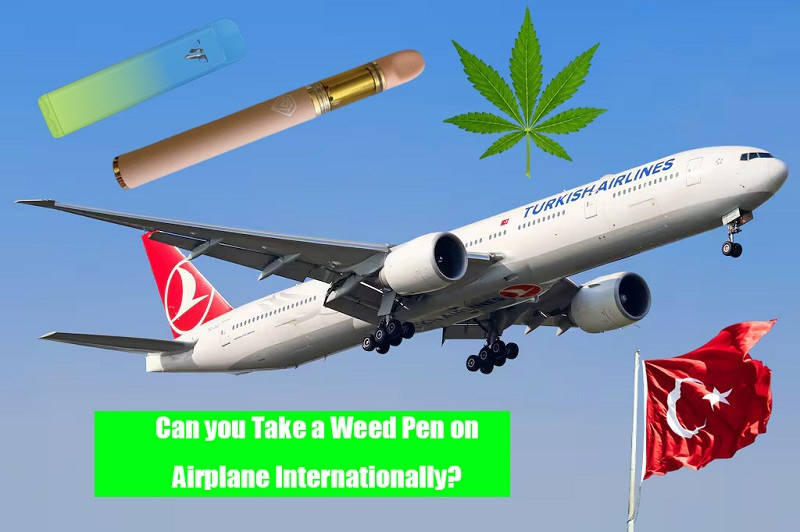 An airport customs area with drug-sniffing dogs and security personnel.
An airport customs area with drug-sniffing dogs and security personnel.
4. What’s the Best Way to Take a Weed Pen Through TSA and Customs?
If you decide to fly with THC vape cartridges, keep in mind that it is not legal under federal law. The TSA focuses on detecting explosives, weapons, and other dangerous items, not drugs.
- Cleanliness: Ensure empty vape pens or dry herb vaporizers are completely clean of any residue.
- Concealment: Remove any pot leaf icons or markings from weed pens and oil bottles.
- Smell-Proof Container: Place the weed pen in a smell-proof container to avoid detection by scent.
- Liquid Regulations: Cartridges with liquid must be placed in a quart-sized bag for inspection at security checkpoints.
- Carry-On Only: Never put the pen in checked luggage, as electronic cigarettes are banned due to fire risk.
- Confidence: Act confidently and avoid appearing nervous, as this can draw unwanted attention.
If questioned, state that the liquid is nicotine. TSA agents cannot test the substance and must rely on your word.
For international flights, the risk is much higher. Customs areas often have drug-sniffing dogs, especially on flights from areas known for drug production. If you are unsure whether a dog can detect even trace amounts of weed, it is best not to risk bringing the vape pen.
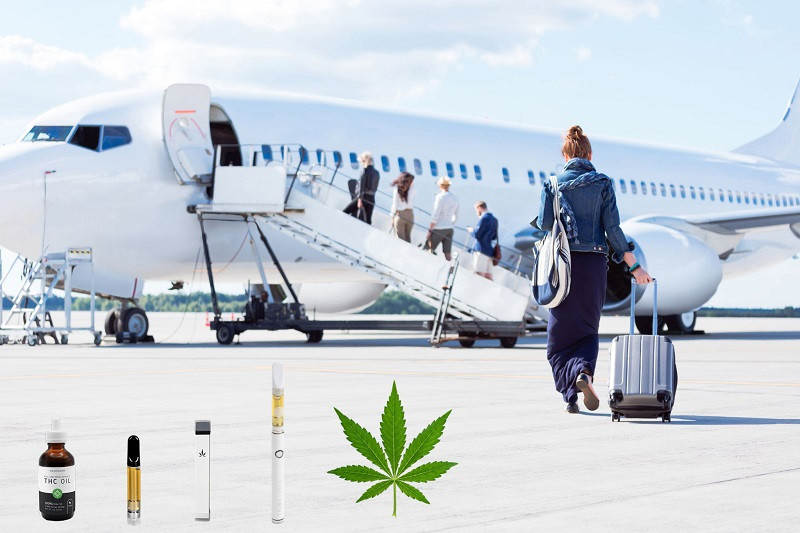 Tips on packing a weed pen discreetly in a carry-on bag with other travel essentials.
Tips on packing a weed pen discreetly in a carry-on bag with other travel essentials.
5. What Happens if the TSA Finds a Weed Pen?
The TSA’s primary goal is to ensure flight safety, not to find drugs. However, if they discover a weed pen, they may turn you over to airport security or local police.
In states and cities where cannabis is legal, local authorities may not take action. In areas where it remains illegal, you could face consequences such as a search, interrogation, and confiscation of the vape pen.
If traveling to a state where cannabis is legal, it may be safer to purchase and consume it there rather than attempting to fly with it.
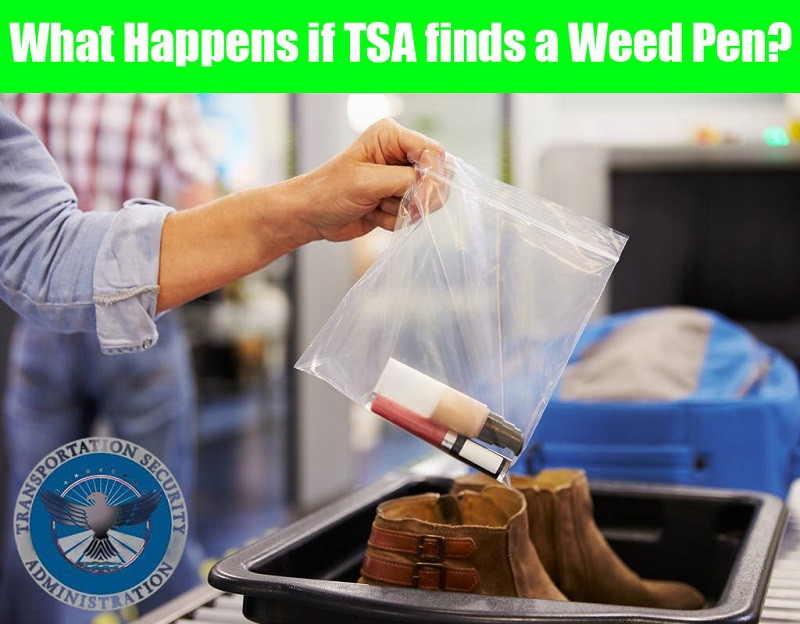 A TSA agent inspecting a bag at an airport security checkpoint.
A TSA agent inspecting a bag at an airport security checkpoint.
6. Can You Fly With a CBD Vape Pen?
Cannabidiol (CBD) is a non-psychoactive component of cannabis derived from hemp plants. The TSA allows cannabis products containing no more than 0.3 percent THC on a dry weight basis, or those approved by the FDA, in carry-on or checked luggage.
In most cases, flying with CBD is permitted, unless you are traveling to a state with particularly strict regulations.
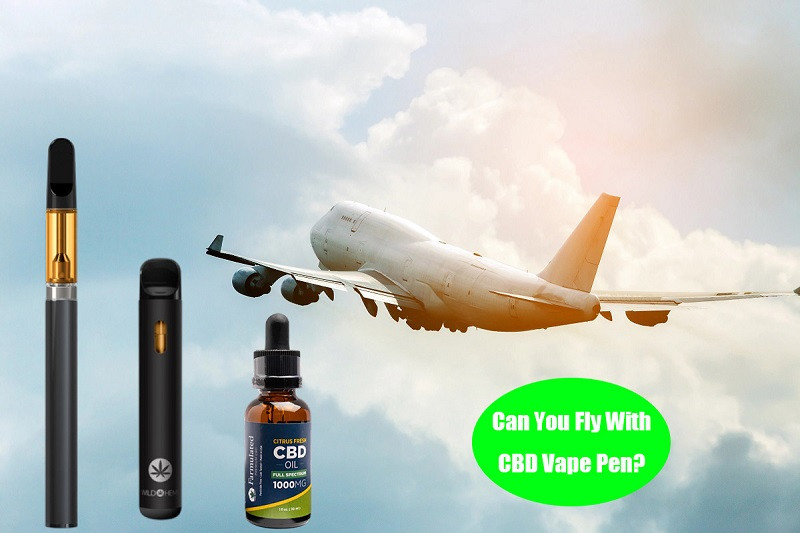 A selection of CBD vape pens and oil cartridges.
A selection of CBD vape pens and oil cartridges.
7. Will Weed Pens Set Off Metal Detectors at Airports?
Weed pens with metal components may trigger metal detectors. To avoid issues, remove the pen from your pockets and keep it in your carry-on luggage while going through security.
Explore more about metal detectors and vaping devices on flyermedia.net.
8. Regulations of Marijuana and CBD in US
Navigating the legal landscape of marijuana and CBD in the United States requires understanding both federal and state laws, which can often differ significantly. Federally, marijuana remains classified as a Schedule I controlled substance, making it illegal under U.S. law. However, many states have enacted their own laws legalizing marijuana for medical or recreational use, creating a complex and sometimes conflicting legal environment.
Federal Law
Under the Controlled Substances Act (CSA), marijuana is categorized alongside drugs like heroin, indicating that the federal government views it as having a high potential for abuse and no accepted medical use. This classification makes the production, distribution, and possession of marijuana a federal crime. The Drug Enforcement Administration (DEA) is the primary agency responsible for enforcing these laws.
State Laws
Despite the federal prohibition, a growing number of states have legalized marijuana in some form. As of 2023:
- Medical Marijuana: Over 30 states have legalized marijuana for medical use, allowing patients with certain conditions to access cannabis with a doctor’s recommendation.
- Recreational Marijuana: More than 20 states have also legalized marijuana for recreational use, permitting adults over the age of 21 to purchase and possess cannabis.
- Decriminalization: Some states have decriminalized marijuana, reducing the penalties for possession to a fine or civil infraction rather than a criminal charge.
CBD Regulations
CBD’s legal status is somewhat different due to the 2018 Farm Bill, which legalized hemp-derived CBD products containing no more than 0.3% THC at the federal level. However, the FDA regulates CBD products, particularly those marketed for therapeutic purposes. States also have their own laws regarding CBD, which can vary widely.
Key Differences and Considerations
- THC Content: The primary distinction between legal hemp-derived CBD and illegal marijuana is the THC content. Hemp must contain no more than 0.3% THC.
- Interstate Commerce: While states can legalize marijuana within their borders, the federal government still prohibits the interstate transport of marijuana.
- Federal Supremacy: Federal law remains supreme, meaning that federal authorities can still enforce marijuana laws even in states where it is legal. However, in recent years, the federal government has generally deferred to state laws, particularly in states with well-regulated marijuana programs.
Summary Table of Marijuana and CBD Laws
| Aspect | Federal Law | State Laws |
|---|---|---|
| Marijuana | Illegal under the Controlled Substances Act. | Legal for medical use in over 30 states; legal for recreational use in more than 20 states; decriminalized in some states. |
| CBD | Legal if derived from hemp with no more than 0.3% THC (2018 Farm Bill). | States may have their own regulations regarding CBD production, distribution, and sale. Some states have stricter requirements for CBD products than federal law. |
| FDA Regulation | Regulates CBD products, especially those marketed for therapeutic purposes. | States may also have their own regulatory agencies overseeing the production and sale of CBD products. |
| Interstate Transport | Prohibited for marijuana. | Generally permitted for hemp-derived CBD products that comply with federal law, but state laws may impose additional restrictions. |
| Enforcement | DEA enforces federal laws. | State and local law enforcement agencies enforce state laws, but federal authorities can still intervene, particularly in cases involving interstate trafficking or other federal violations. |
For more detailed information and updates on aviation regulations and related topics, visit flyermedia.net.
9. FAA Regulations
The FAA has specific regulations regarding the use of cannabis and other controlled substances by aviation personnel, including pilots, air traffic controllers, and mechanics. These regulations are designed to ensure safety in the skies and maintain the highest standards of conduct for those responsible for operating and maintaining aircraft.
Key Points of FAA Regulations
- Prohibition of Use: The FAA prohibits aviation personnel from using cannabis or any other controlled substance, regardless of state laws. This means that even if marijuana is legal in a particular state, pilots and other safety-sensitive employees are not allowed to use it.
- Zero Tolerance Policy: The FAA has a zero-tolerance policy for drug use, meaning that any detectable amount of a prohibited substance can result in disciplinary action.
- Drug Testing: Aviation personnel are subject to regular drug testing, including pre-employment, random, and post-accident testing. These tests are designed to detect the presence of cannabis and other controlled substances.
- Reporting Requirements: Aviation personnel are required to report any drug-related incidents, including arrests, convictions, or treatment programs. Failure to report such incidents can result in disciplinary action.
- Medical Marijuana: The FAA does not recognize medical marijuana as a valid medical condition for which an exemption can be granted. This means that even if a pilot has a medical marijuana card, they are still prohibited from using cannabis.
- CBD Products: The FAA advises caution when using CBD products, as they may contain trace amounts of THC that could result in a positive drug test. Aviation personnel are responsible for ensuring that any products they use do not violate FAA regulations.
Consequences of Violating FAA Regulations
The consequences of violating FAA regulations regarding cannabis and other controlled substances can be severe, including:
- Suspension or Revocation of Certificates: Pilots and other aviation personnel who violate FAA regulations may have their certificates suspended or revoked, preventing them from working in the aviation industry.
- Civil Penalties: The FAA may impose civil penalties for violations of its regulations.
- Criminal Charges: In some cases, violations of FAA regulations may result in criminal charges.
Summary Table of FAA Regulations
| Regulation | Description | Consequences |
|---|---|---|
| Prohibition of Use | Aviation personnel are prohibited from using cannabis or any other controlled substance, regardless of state laws. | Suspension or revocation of certificates, civil penalties, criminal charges. |
| Zero Tolerance Policy | The FAA has a zero-tolerance policy for drug use, meaning that any detectable amount of a prohibited substance can result in disciplinary action. | Suspension or revocation of certificates, civil penalties, criminal charges. |
| Drug Testing | Aviation personnel are subject to regular drug testing, including pre-employment, random, and post-accident testing. | Suspension or revocation of certificates, civil penalties, criminal charges. |
| Reporting Requirements | Aviation personnel are required to report any drug-related incidents, including arrests, convictions, or treatment programs. | Suspension or revocation of certificates, civil penalties, criminal charges. |
| Medical Marijuana | The FAA does not recognize medical marijuana as a valid medical condition for which an exemption can be granted. | Suspension or revocation of certificates, civil penalties, criminal charges. |
| CBD Products | The FAA advises caution when using CBD products, as they may contain trace amounts of THC that could result in a positive drug test. | Suspension or revocation of certificates, civil penalties, criminal charges. |
For the most accurate and up-to-date information on these regulations, please consult official FAA resources or visit flyermedia.net.
10. Key Takeaways
In conclusion, while flying with weed pens is possible, it is not without risk. Here are the key points to remember:
- Legality: Flying with THC vape cartridges is illegal under federal law.
- TSA Focus: The TSA is primarily concerned with security threats, not drug enforcement.
- International Travel: Avoid traveling internationally with weed pens due to strict customs regulations.
- CBD Products: Flying with CBD vape pens is generally allowed, provided they contain less than 0.3 percent THC.
- FAA regulations: Know that the FAA has specific regulations regarding the use of cannabis and other controlled substances by aviation personnel
 A selection of CBD vape pens and oil cartridges.
A selection of CBD vape pens and oil cartridges.
Ultimately, the decision to fly with a weed pen is a personal one. Weigh the risks and potential consequences carefully. Consider purchasing cannabis at your destination or taking a tolerance break instead.
Remember to stay informed and prioritize safety and legality.
FAQ Section
1. Can you bring a weed pen on a plane?
While technically possible, bringing a weed pen on a plane is illegal under federal law, even if cannabis is legal in your origin and destination states.
2. What happens if TSA finds a weed pen?
If the TSA finds a weed pen, they may turn you over to airport security or local police. The consequences can range from confiscation to arrest, depending on local laws.
3. Can you fly with a CBD vape pen?
Yes, you can generally fly with a CBD vape pen if it contains no more than 0.3 percent THC, as allowed by federal law.
4. Will a weed pen set off metal detectors at airports?
Weed pens with metal components may set off metal detectors. It’s best to remove the pen from your pockets and place it in your carry-on luggage.
5. Is it legal to travel internationally with a weed pen?
No, it is not advisable to travel internationally with a weed pen due to strict customs regulations and varying international laws regarding cannabis.
6. What is the best way to conceal a weed pen when flying?
To conceal a weed pen, clean it thoroughly, remove any cannabis-related markings, and place it in a smell-proof container within your carry-on bag.
7. Are there specific regulations for carrying vape pens on a plane?
Yes, vape pens must be carried in your carry-on luggage, not checked baggage, due to the lithium batteries. They should be turned off and stored securely.
8. Can TSA agents test the liquid in a vape pen cartridge?
No, TSA agents cannot test the liquid in a vape pen cartridge and must rely on your statement if questioned.
9. What should you do if questioned by TSA about a weed pen?
If questioned, remain calm and state that the pen is for nicotine, as TSA agents cannot verify the contents.
10. Are there alternative ways to obtain cannabis at your destination?
Yes, consider purchasing cannabis at your destination if it is legal there, or use your vacation as a tolerance break.
Ready to take your aviation knowledge to new heights? Visit flyermedia.net now to discover a wealth of information on flight training, aviation news, and career opportunities! Your journey to the skies starts here! For any further information, please contact us at Address: 600 S Clyde Morris Blvd, Daytona Beach, FL 32114, United States. Phone: +1 (386) 226-6000. Website: flyermedia.net.